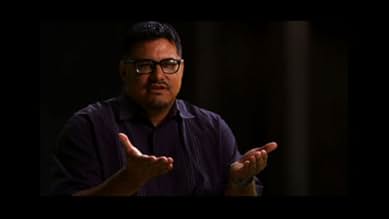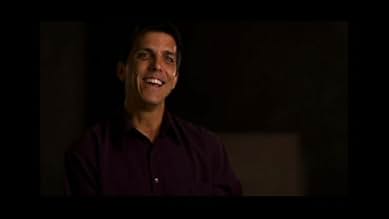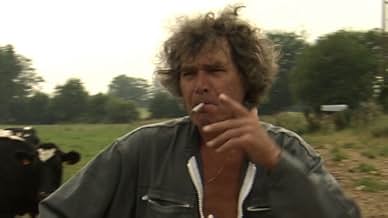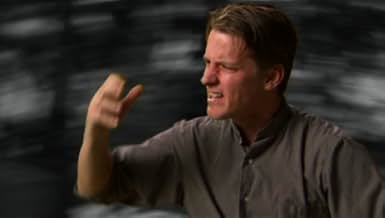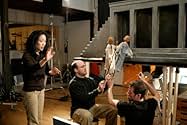Jessica Yu's documentary explores the relationship between human life and Euripidean dramatic structure by weaving together the stories of four men: German terrorist, a bank robber, an "ex-g... Read allJessica Yu's documentary explores the relationship between human life and Euripidean dramatic structure by weaving together the stories of four men: German terrorist, a bank robber, an "ex-gay" evangelist, and a martial arts student.Jessica Yu's documentary explores the relationship between human life and Euripidean dramatic structure by weaving together the stories of four men: German terrorist, a bank robber, an "ex-gay" evangelist, and a martial arts student.
- Awards
- 1 win & 3 nominations total
- Director
- Writer
- All cast & crew
- Production, box office & more at IMDbPro
7.3578
1
2
3
4
5
6
7
8
9
10
Featured reviews
Point of view
I saw the movie at the sundance film fest.I must say I missed a small part of the beginning but was still able to get the idea and form an opinion.I felt the balance and nature of the feelings the 4 people lived through.I think we all have been faced with things we consider pivotal moments in our lives this film addresses the extreme moments of 4 men who were faced with life altering decisions in some peoples eyes the decisions were wrong but I think the point was wright or wrong we need to look at the whole situation to be a victim or deal with the issue it all depends on the persons will and how guilt can motivate you to sink or swim.
perceptive study of the human psyche
"The child is father to the man" is the underlying principle behind "Protagonist," an intriguing, psychologically profound documentary that explores what it means to be a "man" in the modern world. The movie focuses on four very different individuals who generously share the stories of their lives with us. As a diminutive child, Mark Salzman was so often the target of bullying and harassment that he trained himself to become a master in the martial arts. Mark Pierpont is a gay man who has spent much of his life trying to reconcile his strict religious beliefs with his homosexuality. Joe Loya was the victim of massive physical abuse at the hands of his father and turned to a life of crime as a result. And Hans-Joaquim Klein is an older German man, the son of an authoritarian police officer and a mother who spent time in a concentration camp, who, in response to the inhumanity and social injustice he saw in the world around him, became a well-known violent revolutionary during the radical heyday of the 1960s and '70s.
More than anything else, the movie shows how we are all ultimately the product of our environments and upbringings - even if all that means is that we spend our whole lives actively, and often futilely, fighting against that fact. Indeed, much as we may not like to admit it, our pasts define who we are as individuals and how we deal with the world around us. What unites these four men is their obsessive need to overcome what they like least about themselves - be it their physical or emotional weakness, their sexuality, their perceived wickedness - and to do so through a compulsive marshaling of the will and an intense application to a single activity (in their cases, martial arts, bank robbery, antigay proselytizing and violent extremism). Eventually, it is these activities that allow the men to feel that they have achieved at least some measure of "control" over their lives (however dubious that may be). In addition, this new-found acceptance from the people around them finally gives the men that sense of self-worth they were never able to achieve as children. Unfortunately, however, they soon learn that sublimation can take us only so far before our true natures begin to assert themselves or before we come to realize that the direction our life is headed in is clearly not the right one. And that, we come to realize, is what is meant by "maturity," a maturity reflected in the thoughtful and honest self-appraisal each of these men undergoes throughout the course of the film. And, by the end, all four have achieved a kind of peace-through-acceptance, a redemption and regeneration based on knowing who they are and finally coming to terms with the past that has clearly molded - but not defeated - them.
Director Jessica Yu has provided a generous helping of photos and film clips from the men's pasts to flesh out the interviews. And, in the film's most unusual artistic touch, she utilizes puppets to dramatize some of the events in the men's lives and to serve as a literal Greek-chorus providing running commentary on the subject.
Unique in form and universal in content, "Protagonist" is an amazingly insightful and thought-provoking look into the complex entity that is the human psyche.
More than anything else, the movie shows how we are all ultimately the product of our environments and upbringings - even if all that means is that we spend our whole lives actively, and often futilely, fighting against that fact. Indeed, much as we may not like to admit it, our pasts define who we are as individuals and how we deal with the world around us. What unites these four men is their obsessive need to overcome what they like least about themselves - be it their physical or emotional weakness, their sexuality, their perceived wickedness - and to do so through a compulsive marshaling of the will and an intense application to a single activity (in their cases, martial arts, bank robbery, antigay proselytizing and violent extremism). Eventually, it is these activities that allow the men to feel that they have achieved at least some measure of "control" over their lives (however dubious that may be). In addition, this new-found acceptance from the people around them finally gives the men that sense of self-worth they were never able to achieve as children. Unfortunately, however, they soon learn that sublimation can take us only so far before our true natures begin to assert themselves or before we come to realize that the direction our life is headed in is clearly not the right one. And that, we come to realize, is what is meant by "maturity," a maturity reflected in the thoughtful and honest self-appraisal each of these men undergoes throughout the course of the film. And, by the end, all four have achieved a kind of peace-through-acceptance, a redemption and regeneration based on knowing who they are and finally coming to terms with the past that has clearly molded - but not defeated - them.
Director Jessica Yu has provided a generous helping of photos and film clips from the men's pasts to flesh out the interviews. And, in the film's most unusual artistic touch, she utilizes puppets to dramatize some of the events in the men's lives and to serve as a literal Greek-chorus providing running commentary on the subject.
Unique in form and universal in content, "Protagonist" is an amazingly insightful and thought-provoking look into the complex entity that is the human psyche.
Fince Concept, Flawed Selections
I thought about making the title of this review "One of the ain't' like the other one". The subjects of the interviews in this film are a terrorist who turned some of his co-conspirators in, a bank robber that tried to kill his father, a repressed homosexual who made a living convincing other people that they too can be straight, and....a guy that took some Kung Fu Lessons. And his first teacher was a jerk. I'm serious. That's his story. He was a bit of a nerd, so he got into martial arts and he wound up studying with a really intense guy that was...less than dependable? Prone to errant behavior? That's about as dramatic as it gets with him.
I gave this movie a 5 out of 10 because 2 out of the 4 subjects were interesting. The other two were not. The Kung Fu student probably didn't give them much to work with. But the gay televangelist might have been compelling if his story were not so predictable. But it is.
She should have found two more subjects to make a better movie. The production values were good and the narrative conceit of Greek tragedy told through puppets had great potential. But the impact of the movie is blunted by the inevitable reaction of "Why was the kung fu guy included in this?"
I gave this movie a 5 out of 10 because 2 out of the 4 subjects were interesting. The other two were not. The Kung Fu student probably didn't give them much to work with. But the gay televangelist might have been compelling if his story were not so predictable. But it is.
She should have found two more subjects to make a better movie. The production values were good and the narrative conceit of Greek tragedy told through puppets had great potential. But the impact of the movie is blunted by the inevitable reaction of "Why was the kung fu guy included in this?"
A wonderful documentary
Simply a wonderful documentary.
This film is a simple, humble, intelligent and beautifully crafted work of art. A must see for everyone who is interested in people stories about human transformation and growth of the individual.
The careful selection of the 4 interviewees (the protagonists), the use of Greek mythology and puppetry leaves the viewer astonished and amazed right up to the end. I can not stress that the film's brilliance is in its constructiveness and the narrative's simplicity.
A small sensible documentary that one could class along such other great documentaries as Être et Avoir, Capturing the Friedmans, Titicut Follies. Definitely,One of the great documentaries of the year!
It is unnecessary to say more, watch be amazed, moved and touched.
This film is a simple, humble, intelligent and beautifully crafted work of art. A must see for everyone who is interested in people stories about human transformation and growth of the individual.
The careful selection of the 4 interviewees (the protagonists), the use of Greek mythology and puppetry leaves the viewer astonished and amazed right up to the end. I can not stress that the film's brilliance is in its constructiveness and the narrative's simplicity.
A small sensible documentary that one could class along such other great documentaries as Être et Avoir, Capturing the Friedmans, Titicut Follies. Definitely,One of the great documentaries of the year!
It is unnecessary to say more, watch be amazed, moved and touched.
Do yourself a favor!
Oh I wish I had studied Greek Literature in the University or even tried a little harder on the "Ancient Greek" class during the last three years in high school. If not anything else I would be able to be more accurate and informative for the reader of this comment about "Protagonist".
Sure thing is, my limited knowledge from my school years helped me a lot in understanding the concept of this one-of-a-kind documentary and appreciate its multi-level structure. There are so many levels you can approach the movie, that it seems an impossible task for me to put them all in here.
The easiest approach for me, and I guess for any viewer, would/will be to put his/her self in the same examination the director did with the lives of the protagonists. Needless to say this not only will us understanding our "heroes" but moreover ourselves, our choices and hopefully what we really want and what we really should do to get to that place.
The past is most commonly accused along with some "bad influences" by those who find their life leading them somewhere they don't feel they are meant to be. Sadly its not common for people to accept that they can chance the way their past is working on their present or future. And here comes Protagonist, showing us the path, exactly as Ancient Greek Tragedy did, that will lead us to self awareness and finally to happiness....
No second thoughts since you came this far. This is a very useful, interesting and perfectly structured film, so do yourself a favor, thee who read this, and go watch it!
Sure thing is, my limited knowledge from my school years helped me a lot in understanding the concept of this one-of-a-kind documentary and appreciate its multi-level structure. There are so many levels you can approach the movie, that it seems an impossible task for me to put them all in here.
The easiest approach for me, and I guess for any viewer, would/will be to put his/her self in the same examination the director did with the lives of the protagonists. Needless to say this not only will us understanding our "heroes" but moreover ourselves, our choices and hopefully what we really want and what we really should do to get to that place.
The past is most commonly accused along with some "bad influences" by those who find their life leading them somewhere they don't feel they are meant to be. Sadly its not common for people to accept that they can chance the way their past is working on their present or future. And here comes Protagonist, showing us the path, exactly as Ancient Greek Tragedy did, that will lead us to self awareness and finally to happiness....
No second thoughts since you came this far. This is a very useful, interesting and perfectly structured film, so do yourself a favor, thee who read this, and go watch it!
Did you know
- TriviaMark Salzman, the martial arts expert, is an accomplished writer and also director Jessica Yu's husband. Many of the personal life stories he shares are from his book Lost in Place: Growing Up Absurd in Suburbia (1995).
- ConnectionsFeatures Kung Fu (1972)
Details
Box office
- Budget
- $800,000 (estimated)
- Gross US & Canada
- $13,850
- Opening weekend US & Canada
- $4,495
- Dec 2, 2007
- Gross worldwide
- $13,850
Contribute to this page
Suggest an edit or add missing content


